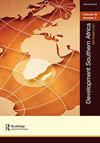南非姆普马兰加省农村家庭粮食安全的模式和趋势
IF 1.3
4区 经济学
Q3 DEVELOPMENT STUDIES
引用次数: 0
摘要
摘要本研究考察了2010 - 2019年南非姆普马兰加省Bushbuckridge地区家庭粮食安全的模式和趋势。我们使用的数据来自阿金库尔健康和社会人口监测系统中的家庭面板。调查结果表明,在过去十年中,这一农村地区的家庭粮食安全状况有所改善。通过多元主成分分析,构建了一个总体粮食安全指数,我们观察到一小部分家庭(7.8%)长期处于粮食不安全状态。使用有序概率模型估计粮食安全的决定因素。研究结果表明,观察到的家庭粮食安全状况差异是社会经济地位差异的结果。因此,我们建议,如果要在南非农村及其他地区实现普遍的家庭粮食安全,就必须把重点放在确定经济机会和赋予长期粮食不安全家庭权力上。作者感谢受访者、现场工作人员和南非威特沃特斯兰德大学卫生科学学院公共卫生学院SAMRC/威特沃特斯兰德农村公共卫生与健康转型研究单位的管理层,感谢他们各自为本研究中使用的数据的收集和生产所做的贡献。这项成功的研究是在国家研究基金会、ACCESS和世界农林业中心的资助下进行的。这项研究间接得到了英国威康信托基金(资助085477/Z/08/Z)、南非医学研究理事会和南非科学与创新部通过南非人口研究基础设施网络(SAPRIN)对阿金库尔HDSS运行的资助或支持。披露声明作者未报告潜在的利益冲突。本研究是公共社会生态系统(SUCSES)可持续性研究的一部分,由南非国家研究基金会(NRF)和气候与地球系统科学应用中心(ACCESS)资助。威康信托基金通过支持阿金库尔健康和人口监测系统提供了间接支助(赠款085477/Z/08/Z)。该研究还受益于科罗拉多大学人口中心(项目2P2CHD066613-06)提供的研究、管理和计算支持,该中心由尤尼斯肯尼迪施莱弗国家儿童健康与人类发展研究所资助。本文章由计算机程序翻译,如有差异,请以英文原文为准。
Patterns and trends in household food security in rural Mpumalanga Province, South Africa
ABSTRACTThis study examines patterns and trends in household food security in Bushbuckridge, Mpumalanga Province, South Africa, from 2010 to 2019. We use data from a household panel nested in the Agincourt Health and Socio-Demographic Surveillance System. Findings indicate that there have been improvements in household food security in this rural setting over the last decade. By polychoric principal component analysis, an aggregate food security index was constructed and we observed a small, yet important, proportion of households (7.8%) that remained chronically food insecure. An ordered probit model was used to estimate the determinants of food security. Findings reveal that the observed differences in household food security status are as a result of differences in socioeconomic status. We therefore recommend that focus must be placed on identifying economic opportunities and empowering the chronically food insecure households if universal household food security is to be attained in rural South Africa and beyond.KEYWORDS: Food availabilitydietary diversityfood accessfood securityrural households AcknowledgementsThe authors are grateful to the respondents, field staff and management of SAMRC/Wits Rural Public Health and Health Transitions Research Unit, School of Public Health, Faculty of Health Sciences, University of the Witwatersrand, South Africa for their respective contributions towards the collection and production of the data used in this study. The SUCSES study was made possible with funding from the National Research Foundation, ACCESS, and the World Agroforestry Centre. The study was supported indirectly with funding or support for the operation of the Agincourt HDSS from the Wellcome Trust, UK (grant 085477/Z/08/Z), the South African Medical Research Council, and the South African Department of Science and Innovation through the South African Population Research Infrastructure Network (SAPRIN).Disclosure statementNo potential conflict of interest was reported by the author(s).Additional informationFundingThis research was conducted as part of the Sustainability in Communal Socio-Ecological Systems (SUCSES) which was made possible through funding from the National Research Foundation (NRF) of South Africa and the Applied Centre for Climate and Earth Systems Science (ACCESS). Indirect support was provided by the Wellcome Trust (grant 085477/Z/08/Z) through its support of the Agincourt Health and Demographic Surveillance System (HDSS). The study also benefited from research, administrative, and computing support provided by the University of Colorado Population Center (Project 2P2CHD066613-06), funded by the Eunice Kennedy Shriver National Institute of Child Health and Human Development.
求助全文
通过发布文献求助,成功后即可免费获取论文全文。
去求助
来源期刊

Development Southern Africa
DEVELOPMENT STUDIES-
CiteScore
4.20
自引率
7.10%
发文量
42
期刊介绍:
The Development Southern Africa editorial team are pleased to announce that the journal has been accepted into the Thomson Reuters (formerly ISI) Social Science Citation Index. The journal will receive its first Impact Factor in 2010. Development Southern Africa offers a platform for expressing views and encouraging debate among development specialists, policy decision makers, scholars and students in the wider professional fraternity and especially in southern Africa. The journal publishes articles that reflect innovative thinking on key development challenges and policy issues facing South Africa and other countries in the southern African region.
 求助内容:
求助内容: 应助结果提醒方式:
应助结果提醒方式:


